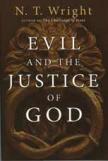Lets Face It
In the past few years we have been exposed to displays of moral evil (9/11/01) and natural catastrophes (the tsunami in 2004, hurricanes Katrina and Rita in 2005). At each point the question “Why?” occupied many of us. The “religious” discussion too often came down to whether these catastrophes should be interpreted as divine punishments on sinners. To most of us, that approach seemed naïve and even highly offensive, given the scope of the disasters and their harm to some very fine persons. The answers from scientists and philosophers also seemed inadequate, so we moved on to other things.
This new volume by N. T. Wright brings a solid biblical perspective to the “problem of evil” and can help us connect better the reality of evil and the basic concerns of Christian faith. Wright is fully aware that the problem of evil is not something that we will solve in the present world. His primary task is not to provide answers to impossible philosophical questions. Rather, it is to point out signs of God’s new world on the basis of Jesus’ death and the power of his Spirit even in the midst of “the present evil age.” After noting that “evil” is still a four-letter word, he considers what we can learn from both the Old and the New Testaments, and how we can apply these theological insights to evil on both global and personal scales.
Wright is a distinguished New Testament scholar who has produced massive volumes on Christian origins and the question of God, the historical Jesus and the resurrection. He is now the Anglican bishop of Durham in England. In addition to his scholarly tomes and episcopal duties, he has written a fine series of popular commentaries on each of the New Testament writings and short books on various topics in biblical theology. He is a dynamic preacher and lecturer, and one of the best representatives of “evangelical” (in the best sense) theology today. He seems to be combining the roles of C. S. Lewis and William Barclay for our generation. Evil and the Justice of God is a good example of his sound biblical theology and remarkable ability to communicate the biblical message with clarity and conviction. He is surely one of the brightest lights in biblical studies today.
In laying out the “new” problem of evil, Wright observes that we ignore evil when it does not hit us in the face, are surprised by evil when it does and then react to it in immature and dangerous ways. For Christians the challenge is how to understand and celebrate God’s goodness and the gift of creation, while understanding and facing up to the reality and seriousness of evil.
The Old Testament writers do not treat evil as philosophers generally do. Rather, they provide a grand narrative about what God has done, is doing and will do about evil. On the one hand, God judges and punishes evil, and sets bounds to evil without destroying human responsibility and agency. On the other hand, God promises and brings about new moments of grace (Abraham, the Servant of the Lord and the like), events that constitute new creation, however much they are shot through with ambiguity.
The multiple ambiguities of God’s actions in the world come together in the story of Jesus as told in the New Testament. Wright shows how the problem of evil and atonement theology (properly understood) belong together. The Gospels tell the story of how evil in the world—political, social, personal, moral, emotional—reached its height and how God’s long-term plan for Israel (and for himself) came to its climax in Jesus’ proclamation of God’s kingdom and his violent death. The resurrection was God’s act of new creation after judgment had fallen on the evil of the old creation. The call of the Gospel for Christians and for the church is to implement the victory of God in the world through suffering love.
In the final two chapters, Wright sketches out ways in which Jesus’ death and resurrection might have their effects on both the global and the personal level. He describes Satan as a nonhuman and nondivine quasi-personal force bent on attacking creation and humankind, and thwarting God’s project. He follows Thomas Aquinas in defining evil as the absence or deprivation of good, the spiritual equivalent of a black hole. The task facing Christians today is to imagine and work toward a world without evil, as envisioned in Revelation 21-22 and Rom 8:19-25. That work involves prayer, holiness and social action, while addressing evil with the message and methods of the cross.
For those who believe that Jesus’ death is the means by which evil has been confronted and dealt with, forgiveness of others and of oneself becomes possible. Indeed it is imperative that those who have experienced divine forgiveness be willing to forgive others and themselves. This process is described memorably in Matt 18:15-35 and has been illustrated in our time in South Africa under the inspiration of Archbishop Desmond Tutu. This kind of forgiveness names and shames evil, and then seeks to reconcile evildoers to right relationship with the community (restorative justice).
Rather than solving the problem of evil, Wright has masterfully brought the resources of the Bible to bear upon it. This book would be excellent reading for Christians struggling with the reality of evil in our world and in their lives. That includes us all.
This article also appeared in print, under the headline “Lets Face It,” in the February 5, 2007, issue.








